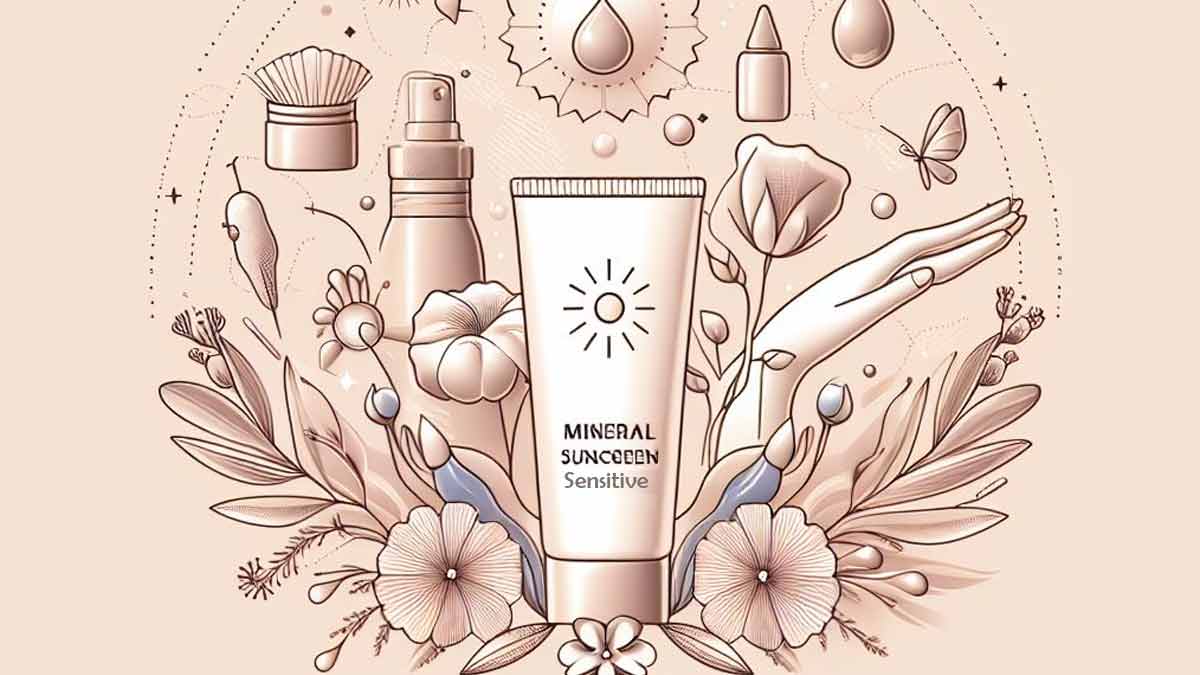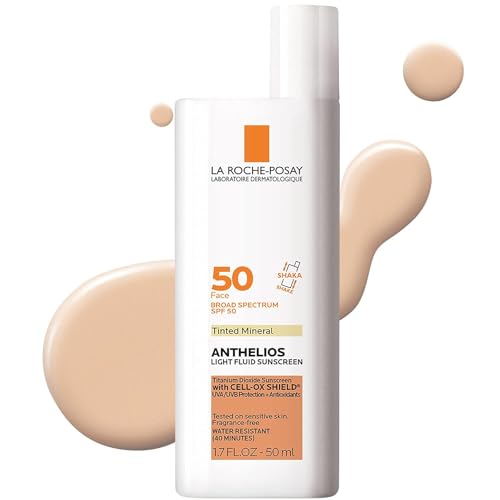If you’ve got hypersensitive skin, you know the drill. Sun protection is crucial, but searching for a non-irritating sunscreen can feel like a minefield. UV rays don’t care about our skin sensitivities – they can lead to sun damage and skin cancer regardless of skin type.
That’s where mineral sunscreens come in, offering a kinder option for sensitive skin types. Unlike chemical sunscreens, which absorb UV rays, mineral sunscreens sit on top of the skin and reflect them away, acting like a shield.
More from Glowing Gorgeous: Find out here the Best Silicone-Free Moisturizers And Why Do You Care
Ingredients like zinc oxide and titanium dioxide are less likely to aggravate your skin. So, how can you shield your hypersensitive skin from the sun without sparking an angry skin revolt?
- Glowing First Glimpse
- Understanding Hypersensitive Skin and Sunscreen
- How to Choose the Right Sunscreen for Hypersensitive Skin
- Application Tips for Sunscreen on Hypersensitive Skin
- Understanding Sunscreen Allergies
- Choosing Between Physical and Chemical Sunscreens
- Consulting with Dermatologists
- Bottom Line
Glowing First Glimpse
- The right sunscreen for hypersensitive skin will likely me a mineral-based options without irritants.
Go for sunscreens that are free from parabens, phthalates, and fragrances, and contain soothing ingredients. - Applying sunscreen correctly and consulting with a dermatologist can significantly improve the experience.
- Protecting hypersensitive skin from the sun’s rays is crucial, but it doesn’t have to come at the cost of comfort or skin health.
Understanding Hypersensitive Skin and Sunscreen
Hypersensitive skin reacts strongly to stimuli that other skin types might shrug off. It may exhibit redness, itching, and even rash when confronted with harsh ingredients. Many sunscreens contain chemical UV blockers, which protect the skin by absorbing rays but can cause a sting or burn in sensitive skin types.
I recommend physical or mineral sunscreens, which use natural minerals to reflect UV rays away from the skin. Despite the appeal of high SPF, remember that once you go above SPF 50, the higher rating only offers marginal improvements in sun protection.
Ingredients to Avoid
For those with hypersensitive skin, dodging certain ingredients is crucial. Parabens, phthalates, and added fragrances are usual suspects regarding irritation and should be avoided. Always examine the ingredient list before settling on a sunscreen, especially if you have hypersensitive skin.
For a gentler touch, look for sunscreens with calming ingredients like calendula and shea butter—these natural components can soothe the skin while offering sun protection.
Recommended Sunscreens for Hypersensitive Skin
Picking the right sunscreen for hypersensitive skin can be challenging, but I’ve got you covered. La Roche Posay’s Anthelios Mineral Sunscreen Gentle Lotion is at the top of my list.
With an SPF of 50, this gentle lotion is fortified with antioxidants and suitable for sensitive skin. Its creamy texture blends smoothly without leaving a white cast, making it a solid pick for various skin tones.
Another commendable choice is the EltaMD UV Physical Tinted Broad-Spectrum SPF 41 sunscreen. Tinted sunscreens offer a dual purpose in the endless battle against sun exposure; they protect while enhancing skin tone. They’re an excellent choice for a bit of cover-up without the risk of clogged pores or irritation.
This tinted sunscreen boasts zinc oxide and titanium dioxide for UVA and UVB protection, and it’s infused with antioxidants to promote healthy skin. Plus, its formulation is perfect for acne-prone or oily skin.
And let’s not overlook the best Korean sunscreen for sensitive skin: ETUDE Sunprise Mild Airy Finish Sun Milk SPF50+
More from Glowing Gorgeous: Find out here Hyram’s Recommended Face Sunscreens For The Summer
This mineral sunscreen contains zinc oxide, providing broad-spectrum protection without irritating the skin. The addition of hyaluronic acid ensures your skin stays hydrated.
How to Choose the Right Sunscreen for Hypersensitive Skin
When you have hypersensitive skin, you need to decode every skincare label. But it’s simpler than that. Look for mineral-active ingredients, such as zinc oxide and titanium dioxide. These provide a protective layer against the sun without the irritation that chemical ingredients may cause.
Non-irritating inactive ingredients are also crucial. Pass up on products with parabens and phthalates; these can trigger sensitive skin. And don’t forget about broad-spectrum protection with a robust SPF—the best sunscreen will shield you from UVA and UVB rays. An expert says, “Many people with sensitive skin can tolerate mineral and chemical options.” It’s all about finding what meshes with your skin type.
Considerations for Acne-Prone Skin
For those balancing acne-prone skin with hypersensitivity, sunscreen shopping can be a real chore. But the goal is clear: pick a sunscreen that won’t clog your pores—noncomedogenic is the term to look for. Products like La Roche Posay Anthelios Clear Skin and Dry Touch Sunscreen are designed to suit your skin type.
La Roche Posay’s sunscreen is oil-free and has an advanced formula that absorbs pore-clogging oil, even in heat and humidity. Its light texture won’t cause breakouts and provides sun protection without leaving any residue that could aggravate your skin. This makes it an excellent pick for reliable sunscreen that respects sensitive, acne-prone skin.
Importance of Hydration and Moisturization
Keeping your skin hydrated and moisturized is somehow more challenging when it’s sensitive. But here’s something you might not know: the right sunscreen can actually help with that. Look for sunscreens that include ingredients like hyaluronic acid, which can aid in attracting moisture to your skin.
Not only does a good sunscreen protect your skin from sun damage, but it can also act as a moisturizer. The best Korean sunscreen options often do this well, marrying sun care with skin hydration. For instance, products such as DERMALOGY by NEOGENLAB UVA/UVB SPF50 Day-Light Protection Airy Sunscreen boost your skin’s moisture while guarding you from harmful rays.
This sunscreen from DERMALOGY is infused with 20 types of plant extracts soothes, moisturizes and controls sebum, reducing the need for an extra moisturizing step in your routine. Its hybrid based formula (both mineral and physical sunscreen) offers broad-spectrum SPF protection while ensuring your sensitive skin remains calm, hydrated, and healthy throughout the day.
Application Tips for Sunscreen on Hypersensitive Skin
Applying sunscreen to hypersensitive skin doesn’t have to be a stressful affair. It’s all about being gentle and thorough. Start using a quarter-size dollop on your face, ensuring you cover all areas evenly without rubbing too vigorously. Think of a shot glass-sized quantity for your body to get the coverage you need. This may seem like a lot, but it’s necessary for proper protection.
We often forget the reapplication rule – once is not enough. It’s crucial to reapply sunscreen every two hours, especially after swimming or sweating. Water and perspiration can wash away your sun care, leaving your skin vulnerable to UV rays that can cause skin cancer and other sun damage. For extra sensitive people, consider spraying SPF50 options that are touch-free and can ease the application process without having to spread the product manually.
And for those moments when reapplication is a must but convenience is key, always have a spray SPF 50 ready. A quick mist can re-up your sun protection without messing up your look or irritating your skin.
Sometimes, no matter how suitable sunscreen is, your skin might still protest. In cases like that, UPF clothing with long sleeves and wide-brimmed hats can become your skin’s best friend, offering an extra layer of sun protection without requiring direct application. These physical barriers can be a real savior, effectively blocking out harmful UV and UVB rays, and they don’t require reapplication.
And when it comes to sunscreen, don’t skimp. We’re discussing defending against skin cancer and keeping your sensitive skin healthy. Make these habits a regular part of your routine, and your skin will thank you for it, seriously.
Understanding Sunscreen Allergies
When discussing sunscreen for hypersensitive skin, we must consider the unpleasant reality of sunscreen allergies. Allergic contact dermatitis is one kind of reaction—think of it as your skin throwing a fit when it doesn’t like an ingredient in your sunscreen. It’s like your skin telling you, “Hey, this stuff? Not a fan.”
Then there’s a bit more complicated called photoallergic contact dermatitis, which is your skin’s delayed reaction when the product is exposed to sunlight. It’s sneaky because you won’t know it’s happening until you enjoy the sun.
Now, let’s get serious about spotting these allergic reactions. We’re looking for clues like redness, flaky patches, that annoying burning sensation, or the feeling that your skin is stinging. If your skin’s acting up after you’ve slathered on your sunscreen, it might be trying to tell you something.
Patch testing is critical here. Apply a small amount of sunscreen to a discreet area and give it a day—your skin’s response will be your guide. And here’s something to chew on: chemical sunscreens are the usual suspects for allergic contact dermatitis, while fragrances and preservatives join the lineup, often leading to those pesky symptoms I mentioned.
Choosing Between Physical and Chemical Sunscreens
Choosing between physical and chemical sunscreens can seriously affect your skin’s happiness. Physical sunscreens, like EltaMD UV Clear Broad-Spectrum SPF 46, sit on top of your skin, creating a barrier between you and those UV rays. It’s like having a loyal bodyguard who’s also kind to sensitive skin types.
EltaMD’s sunscreen boasts zinc oxide with a hint of titanium dioxide to shield you from UVA and UVB rays. It’s also packed with niacinamide, which can soothe red, irritated skin, and hyaluronic acid to moisturize. It’s ideal for those with skin that doesn’t get along with everyone. This one’s got a gentle touch for sensitive folks and a clear finish that won’t leave a white cast.
Chemical sunscreens, on the other hand, are the ones that absorb into the skin and then absorb UV rays, changing them into heat, which is then released from the skin. They’re like a sponge that soaks up the sun’s energy.
These sunscreens are ideal for everyday use and are usually easier to apply without leaving any residue. Remember, the best sunscreen is the one you will use consistently, so consider your skin type and preferences when choosing.
Consulting with Dermatologists
You’ve realized that not all sunscreens match your sensitive skin. But don’t worry, that’s where dermatologists come into the picture. They’re like detectives for your skin, figuring out what works and what sets off alarm bells. I can’t stress enough how important having a professional in your corner is. They can guide you to the best sunscreen for hypersensitive skin without the trial and error that can irritate.
Dermatologists know how to dig into ingredients and make sense of those long, scientific names. They’ll help you determine whether mineral sunscreen, zinc oxide, titanium dioxide, or a different formulation is your best bet. And a patch test? That’s their jam. They can test potential products on small skin areas to watch for reactions, sidestepping a full-blown skirmish.
So, here’s what you should do: pick up the phone, get online, however you prefer, and book that consultation. A dermatologist can tailor their sun protection advice to your unique skin type and history. Each person’s skin has its own quirks, and personalized advice is gold when caring for it properly. Trust me, your skin will thank you for it.
Bottom Line
We’ve walked through the complexities of shielding hypersensitive skin from the sun, emphasizing the need for careful choice. Remember, mineral sunscreens with zinc oxide or titanium dioxide are your friends for sun protection without irritation. Ingredients matter—a lot. Avoid those chemical sunscreens that could spark a skin rebellion, and instead, go for broad-spectrum SPF products that sit on the skin’s surface to reflect UV rays.
Keep a keen eye on sunscreens designed for sensitive skin types, such as La Roche-Posay’s Anthelios Mineral Sunscreen for Sensitive Skin, which has UVA and UVB protection.
With its lightweight formula and the addition of antioxidants, this sunscreen provides a layer of protection without clogging pores or leaving a greasy feel, ideal for those with oily skin. Moreover, it’s a well-regarded choice backed by the Skin Cancer Foundation.
Protecting your hypersensitive skin doesn’t mean missing out on sunny days. It means being smart—choosing the right sunscreen, applying it generously and often, and donning a hat or seeking shade when the sun is fiercest. Be proactive, not reactive, and your skin will thank you.


 La Roche-Posay Anthelios Mineral Sunscreen Gentle Lotion Broad Spectrum SPF 50,...
La Roche-Posay Anthelios Mineral Sunscreen Gentle Lotion Broad Spectrum SPF 50,... EltaMD UV Physical Tinted Face Sunscreen, SPF 41 Tinted Mineral Sunscreen with...
EltaMD UV Physical Tinted Face Sunscreen, SPF 41 Tinted Mineral Sunscreen with... ETUDE Sunprise Mild Airy Finish Sun Milk SPF50+ / PA++++ | Sebum-free,...
ETUDE Sunprise Mild Airy Finish Sun Milk SPF50+ / PA++++ | Sebum-free,... La Roche-Posay Anthelios Clear Skin Dry Touch Sunscreen SPF 60, Oil Free Face...
La Roche-Posay Anthelios Clear Skin Dry Touch Sunscreen SPF 60, Oil Free Face... DERMALOGY by NEOGENLAB UVA/UVB SPF50 Day-Light Protection Airy Sunscreen -...
DERMALOGY by NEOGENLAB UVA/UVB SPF50 Day-Light Protection Airy Sunscreen -... COOLA Organic Sunscreen SPF 50 Sunblock Spray, Dermatologist Tested Skin Care...
COOLA Organic Sunscreen SPF 50 Sunblock Spray, Dermatologist Tested Skin Care... EltaMD UV Clear Face Sunscreen, SPF 46 Oil Free Sunscreen with Zinc Oxide,...
EltaMD UV Clear Face Sunscreen, SPF 46 Oil Free Sunscreen with Zinc Oxide,... La Roche-Posay Anthelios Light Fluid Face Sunscreen Broad Spectrum SPF 60,...
La Roche-Posay Anthelios Light Fluid Face Sunscreen Broad Spectrum SPF 60,...
 La Roche-Posay Anthelios Melt-In Milk Body & Face Sunscreen SPF 60, Oil Free...
La Roche-Posay Anthelios Melt-In Milk Body & Face Sunscreen SPF 60, Oil Free... La Roche-Posay Anthelios Tinted Sunscreen SPF 50, Ultra-Light Fluid Broad...
La Roche-Posay Anthelios Tinted Sunscreen SPF 50, Ultra-Light Fluid Broad... innisfree Daily UV Defense Sunscreen Broad Spectrum SPF 36 Face Lotion, 1.69 Fl...
innisfree Daily UV Defense Sunscreen Broad Spectrum SPF 36 Face Lotion, 1.69 Fl...
Comments